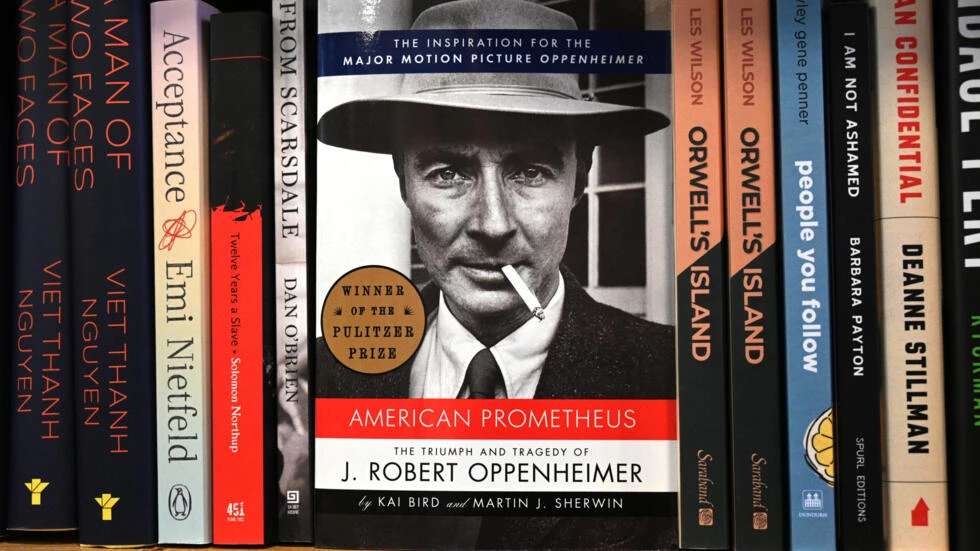Kai Bird has just returned from the Jaipur literature festival, where he signed countless copies of his two-decade-old book for hundreds of young Indians who all watched the film "Oppenheimer."
"American Prometheus," Bird's Pulitzer-winning biography of the father of the atomic bomb, was the basis for the $1 billion-grossing global smash hit movie that is tipped to dominate the Oscars on Sunday.
"It's really an astonishing phenomenon," Bird told AFP.
"I'm probably the luckiest biographer on the planet," he added.
Christopher Nolan's drama was the fourth attempt to adapt Bird and Martin Sherwin's 720-page opus about J. Robert Oppenheimer -- the man who was hailed as an American hero, before being publicly humiliated just a few years later.
Previous efforts had failed to convince Hollywood studio bosses, who found the material too difficult, controversial or complicated, explained Bird.
"I'm actually glad in retrospect, because Nolan came along. And he did something, I think, that is quite special," he said.
Nolan's film hews closely to the 2005 book, often lifting entire lines of dialogue. Bird was involved in the adaptation process.
He first met Nolan for tea in New York in September 2021. The director had been given the book six months earlier, had already written a screenplay, and was about to fly to Ireland to pitch the project to his leading man, Cillian Murphy.
Bird later visited the movie's set in New Mexico, where he was introduced to Murphy during a break in filming.
"As he approached, I couldn't resist -- I shouted out 'Oh, Dr. Oppenheimer, I've been waiting for decades to meet you!'" said Bird.
- 'Beware' -
Even at three hours, Nolan's film cannot possibly capture all the information of a book that took 25 years to research and write.
In the biography, Bird and Sherwin revisit Oppenheimer's wealthy childhood, spent in a luxurious New York apartment adorned with art by Picasso, Cezanne and Van Gogh, attended by nannies and chauffeurs.
Oppenheimer had multiple breakdowns that veered into suicidal thoughts during his early 20s.
He spent much of his final dozen years living in a beach cottage in the Caribbean.
But for Bird, the movie smartly focused on several "timely" themes evoked by Oppenheimer's tragic arc.
"Even the younger generation, they see the film, and they realize that they and their parents have become quite too complacent about living with the bomb," he said.
Russian President Vladimir Putin last week again raised the "real threat" of nuclear war over his invasion of Ukraine.
Bird also believes the highly divisive state of US politics today can be directly traced to the 1950s McCarthyite witch hunts that brought down suspected Communist sympathizers including Oppenheimer.
Donald Trump's mentor, the lawyer Roy Cohn, was chief counsel to Senator Joseph McCarthy, noted Bird.
"So there's a direct connection between the two," he said.
Finally, in another age dominated by rapid technological change -- artificial intelligence, rather than atomic physics -- there is today a lack of famous scientists willing to speak out on politics.
"Part of the reason is exactly what happened to Oppenheimer in 1954, when he was humiliated and destroyed as a public intellectual precisely because he was using his scientific expertise to speak out" on nuclear proliferation, said Bird.
"That sends a message to scientists everywhere. 'Beware of getting out of your narrow band of expertise.'"
- Oscars -
On Sunday, Bird and his wife will attend the Oscars in Hollywood. His tuxedo is already packed.
They will be rooting for "Oppenheimer" across its 13 nominations, but in particular for best adapted screenplay.
Should "Oppenheimer" win best picture, as widely expected, Nolan's speech may well include his oft-repeated belief that Oppenheimer was the most important person who has ever lived.
Does Bird agree?
"When I first heard Nolan say that, I thought, 'Oh, well, this is a little bit of hype for the film,'" he laughed.
But "Oppenheimer gave us the atomic age, he symbolizes that era that we are still living in," Bird said.
"We're always going to be living with the bomb. So in that sense, he actually is the most important man who ever lived."


